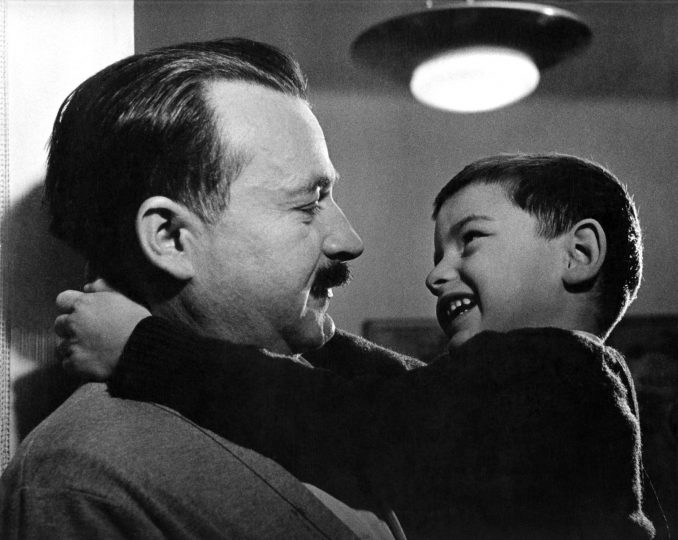Theatre and film director Alfréd Radok (December 17, 1914, Koloděje nad Lužnicí – April 22, 1976, Vienna) was born into the family of a mill owner. After graduating from the Písek Business Academy (1936), he attended aesthetics lectures at the Faculty of Arts, Charles University, until the Nazis closed all of the occupied nation’s universities. Although Radok originally considered studying journalism, he decided resolutely on theatre. He began his career in theatre as student and assistant director (1938–1941) with E. F. Burian. After his directorial beginnings in Prague, Brno and Pilsen, he was interned in a labour camp near Wrocław, Poland, from September 1944 to January 1945, due to his mixed-Jewish heritage.
Radok worked as a stage director in Prague operas and dramatic theatres, such as Divadlo 5. května (1945–1948), the National Theatre (1948–1949, 1954–1959 and 1966–1972), the State Film Theatre (1950–1952), the Village Theatre (1952–1954) and Prague City Theatres (1960–1965). Already his first theatrical works were characterised by novel ideas, a relentless imagination, unusual staging procedures and high precision, taking care of all the stage components (Veselá vdova?, Jedenácté přikázání, Loupežník, Komik, Ďábelský kruh, Hra o lásce a smrti). He was one of the most important Czech directors of the second half of the 20th century, whose work also transcended the borders of his homeland. He also wrote several plays (Vesnice žen, Podivné příhody pana Pimpipána).
In his theatre plays Radok often used film pick-up shots as a stage element. He later realised a climactic symbiosis of film and theatre as one of the creators of Laterna Magika (1956–1959), with which he reaped worldwide success at the Brussels EXPO 58 exhibition. However, film had attracted Alfréd Radok since his youth. He gained his first professional ex[1]perience as an artistic consultant on the Art Nouveau comedy of František Sádek Parohy (The Antlers, 1947). He debuted as a stand-alone director with the suggestive drama Daleká cesta (Distant Journey, 1948). The first Czech feature-length film to deal with the Holocaust was out of step with Czech and world production at the time, but is now ranked among the most important Czechoslovak cinematic works. Due to his stylistic practices, the film, full of symbols and metaphors, came into stark contrast with the incoming Communist powers.
Subsequently, due to censorship Radok could only realise at Barrandov Studio a distorted adaptation of the classical dramatic play by V. K. Klicpera, Divotvorný klobouk (The Magical Hat, 1952), and a loving look at the start of motoring in Bohemia Dědeček automobil (Vintage Car, 1956) according to the novel by Adolf Branald. He also did some remarkable directing work for Czechoslovak Television (plays and productions of V pasti, Ďábel v Bostonu, Šach mat).
In addition to directing awards, he was awarded the Prize of the Czech Lands (1947), the State Prize (1959), the titles Meritorious Artist (1964) and National Artist (1968), the Brussels City Prize (1967), and the Order of T.G. Masaryk, 3rd Class, in memoriam (1991). After the events of August 1968 (Soviet-led invasion of Czechoslovakia), he remained with his family abroad, where he had been successful as a guest director. In 1972 he was officially declared an emigrant by the Czechoslovak authorities (who also revoked all his honorary titles). Radok settled in Sweden, working mainly in Gothenburg. But a lifetime of persecution and a heavy workload, complicated by his status as an emigrant, impacted his health. He died before taking up a directing position at the Burgtheater in Vienna.
His brother was director and polyecran artist Emil Radok (1918–1994). His wife was the playwright, director and actress Marie Tesařová-Radoková (1922–2003). His son David Radok (born 1954) followed in his footsteps as a theatre director. In the years 1992–2013, Alfréd Radok Awards were presented by theatre critics.


